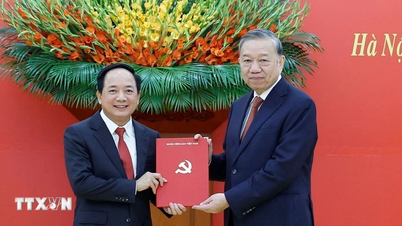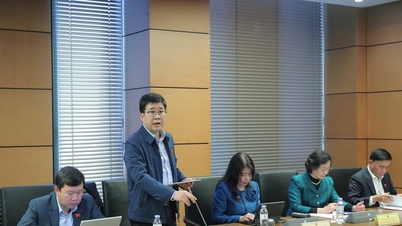Commenting on this draft law in the group, National Assembly member Doan Thi Thanh Mai ( Hung Yen ) said that the draft Law currently regulates management in the direction of traditional "commodity trading". In reality, e-commerce has expanded very rapidly, not only selling tangible goods, but also selling intangible goods, such as: software, online courses, digital copyrights, even valuable documents, electronic certificates. Many platforms today operate like an advertising page, a service brokerage floor or a digital auction floor. If the law only defines e-commerce as "buying and selling goods and services by electronic means", it will certainly soon become outdated.

Therefore, according to delegate Doan Thi Thanh Mai, this amendment to the Law should consider a more open and flexible approach. The delegate suggested that the Drafting Committee study the direction of expanding the scope to transactions of products, services and digital assets. Add a mechanism to allow the Government to pilot and test new e-commerce models when technology develops faster than the law. Thus, when new technologies appear, for example: transactions using blockchain, digital currency, NFT or artificial intelligence... we can allow controlled testing, avoiding having to constantly amend the law, while still ensuring legal safety and state management.
Referring to the current situation, the majority of the e-commerce market share is in the hands of foreign platforms. Profits, data and consumer behavior of Vietnamese people are beyond control. The delegate said that this causes disadvantages, while many e-commerce platforms of Vietnamese enterprises have enough capacity to do so. The delegate suggested research, policies to prioritize, encourage and have a flexible testing mechanism so that Vietnamese e-commerce platforms can compete with international platforms.
According to delegate Doan Thi Thanh Mai, domestic e-commerce platforms should be considered important digital infrastructure, similar to telecommunications or energy. This is not only an economic issue, but also a matter of data security and national digital sovereignty . At the same time, regulations should be added to support digital transformation for individual businesses, for example: exempting or reducing platform fees in the initial phase; providing small credit loans through digital banks; providing free AI tools and chatbots to support sales, as a lever for economic development of households, rural areas and remote areas.

Also regarding this draft Law, National Assembly Deputy Nguyen Van Huy (Hung Yen) was concerned about amending the regulations on the responsibilities of e-commerce platform owners as stipulated in Article 13 of the draft Law. According to the delegate, the current regulations on the responsibilities of e-commerce platform owners have not yet clearly defined the scope, responsibilities, and coordination mechanisms between relevant entities, especially between platform owners, sellers, and state management agencies.
Specifically, in Clause 4, the concept of measures to check, review, remove and handle in a timely manner is still general, lacking specific criteria on time, level and technical process. This can easily lead to different understanding and application by each platform. Meanwhile, in Clause 3, the regulation on online reporting responsibility for real-time removal has too high requirements on technology and operating costs, but there is no content or specific guidance on data, connection infrastructure or information security.
Therefore, delegate Nguyen Van Huy suggested that the drafting agency should conduct additional research on the process, time limit and criteria for handling violations, regulations on technical standards and sanctions for online reporting, creating a legal basis for connecting and sharing data between platforms and state management agencies. Add a three-party coordination mechanism between platforms, sellers and management agencies to help strengthen and effectively monitor and handle violations.
Regarding the development of human resources for e-commerce stipulated in Article 38, delegates said that the new state incentive regulations are only indicative, and have not clearly defined legal responsibilities and the presiding agency or forms of support such as policies, funding, standards, and training programs. This can easily lead to a situation where the policy is very good but difficult to implement in practice.
Therefore, it is necessary to stipulate in the direction that, for Clause 1, the State encourages and supports higher education institutions to develop and implement formal training programs and short-term training programs for e-commerce. The program includes e-commerce law and sustainable development, information security, digital transformation, and training programs that closely follow the needs of the labor market with the participation and comments of businesses and professional social organizations.
Clause 2 should stipulate that the State encourages professional social organizations to participate in training, fostering and granting professional certificates according to standards prescribed by competent authorities, and encourages mutual recognition of domestic and international certificates.
Clause 3 stipulates that the State prioritizes and allocates resources from the State budget for training and fostering human resources and e-commerce in remote areas, developing a national digital learning platform, providing open online courses on e-commerce and improving digital skills for workers.
Delegates shared the view that Vietnam’s e-commerce is at a breakthrough stage. If designed to be open, flexible, encourage domestic innovation, protect consumers and reduce intermediary costs, Vietnamese people can completely master their own digital commerce infrastructure.
Source: https://daibieunhandan.vn/xem-xet-mo-rong-thi-diem-thu-nghiem-cac-mo-hinh-thuong-mai-dien-tu-moi-10394291.html


![[Photo] Ca Mau "struggling" to cope with the highest tide of the year, forecast to exceed alert level 3](https://vphoto.vietnam.vn/thumb/1200x675/vietnam/resource/IMAGE/2025/11/04/1762235371445_ndo_br_trieu-cuong-2-6486-jpg.webp)

![[Photo] Panorama of the Patriotic Emulation Congress of Nhan Dan Newspaper for the period 2025-2030](https://vphoto.vietnam.vn/thumb/1200x675/vietnam/resource/IMAGE/2025/11/04/1762252775462_ndo_br_dhthiduayeuncbaond-6125-jpg.webp)

![[Photo] The road connecting Dong Nai with Ho Chi Minh City is still unfinished after 5 years of construction.](https://vphoto.vietnam.vn/thumb/1200x675/vietnam/resource/IMAGE/2025/11/04/1762241675985_ndo_br_dji-20251104104418-0635-d-resize-1295-jpg.webp)
![[Photo] Ho Chi Minh City Youth Take Action for a Cleaner Environment](https://vphoto.vietnam.vn/thumb/1200x675/vietnam/resource/IMAGE/2025/11/04/1762233574890_550816358-1108586934787014-6430522970717297480-n-1-jpg.webp)
















![[Photo] Prime Minister Pham Minh Chinh chairs the 20th meeting of the National Steering Committee on combating illegal fishing.](https://vphoto.vietnam.vn/thumb/402x226/vietnam/resource/IMAGE/2025/11/04/1762267178314_dsc-0115-jpg.webp)



















































































Comment (0)